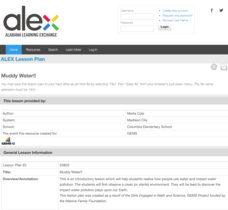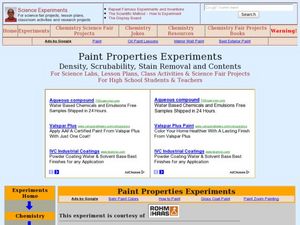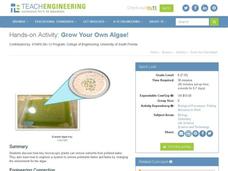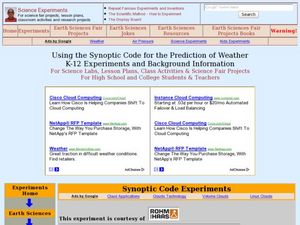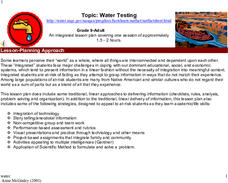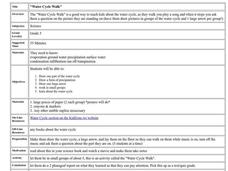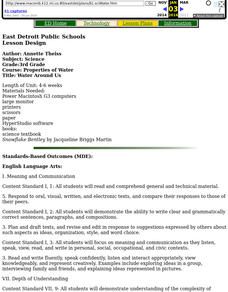Alabama Learning Exchange
Muddy Water!!
Investigate water pollution. Learners start out by completing the know and want to know portions of a KWL chart on water pollution. They read a story that stimulates thinking about water pollution and view an online resource related to...
Curated OER
Project X-35
Students demonstrate rocketry principles through a cooperative, problem solving simulation. They work in teams to simulate the development of a commercial proposal to design, build, and launch a rocket.
Alabama Wildlife Federation
Wildlife Habitat Checklist
Take a walk on the wild side with a project about animal habitats. After kids observe a chosen animal in its home, they describe the animal's food and water sources, shelter, and how it raises its young. They then write a short fictional...
EduGAINs
Understanding Viscosity through Investigation and Comparison of Fluids
Not all liquids are the same. Investigate the viscosity of different fluids with a series of activities designed for eighth grade science. As learners move through learning centers with different experiment setups, they determine the...
ARKive
Adaptations for Movement
What animals are best suited for moving around a rainforest, or a desert? Design your own animal species based on a particular habitat, focusing on the characteristics it will need for optimal movement. Great as a group lesson or...
NOAA
Off Base
How does carbon dioxide affect the world's oceans? The final installment in a series of six lessons has pupils research ocean acidification, then conduct an experiment to witness the delicate balance that exists in our seas. Materials...
Curated OER
WET Science Lesson #5: Pass the Salt Please! (How Road Salt Affects Wetlands)
As an anticipatory set, biologists listen to the story of Ruth Patrick, a scientist who used algae to detect water quality. They observe a demonstration of osmosis and diffusion. In their lab groups, they place Elodea stalks in...
Curated OER
Ecosystems
A critical look into the structure and function of ecosystems is here for young learners as a series of lessons and worksheet activities. Topics covered include land-based and marine ecosystems, connections to the water cycle, food webs,...
Kenan Fellows
The Effects of Environmental Conditions on Aquatic Organisms
What kind of experiment can your class do to how observe the environment effects on organisms? Groups design and conduct lab experiments to learn about the effects of the environment on aquatic organisms. Based upon knowledge gained from...
Curated OER
Fracking: Positive or Negative Impact?
Your teenagers may have heard of fracking, but do they really know what it is? And could they debate the benefits and risks? Educate your environmental science class with a lesson about hydraulic fracturing, non-renewable energy sources,...
Curated OER
Quantitative Determination of the Composition of Water-based Paints and the Correlation of Paint Properties to Pain Composition
Students perform a series of tests on water-based paints. In this chemistry instructional activity, students identify their different functions. They calculate paint density and fractional concentrations.
Curated OER
What's The Matter: A Sinker or Floater?
Students conduct an experiment. For this water lesson, students watch the lesson "Float and Sink" on an interactive website. Students learn how to test items in water and then work in groups to test their items. Students discuss their...
Curated OER
Water-our Precious Resource
Students complete a unit of lessons on water as a limited resource. They conduct Internet research, record information in electronic journals, utilize spreadsheets, conserve water and record the results, and conduct water safety tests on...
Teach Engineering
Red Cabbage Chemistry
Using the natural pH indicator of red cabbage juice, groups determine the pH of different everyday liquids. As they work, pupils gain an understanding of pH that may help deal with contaminants in the water supply.
Teach Engineering
Grow Your Own Algae!
Develop a model of a wastewater treatment center. The last activity of the unit has pupils mix a lake water sample into a tank of water containing fertilizers. Over time, the algae from the lake water grows and removes the nutrient-rich...
Learning Games Lab
Nitrogen in Pollutants
Responsible farming is important for maintaining natural resources. Eager scientists complete a WebQuest to explore what happens to nitrogen when it enters the soil. They learn about the chemical makeup of nitrogen-based molecules and...
NOAA
Seamounts
How do chains of islands form? Young oceanographers explore the mountains of the deep in the final installment in a 13-part series. The interactive compares types of seamounts based on their overall height and height under the water, as...
Curated OER
Pond Water Survey
Students identify and describe various organisms living in a pond water environment. They describe the characteristics of living things. Students compare and contrast organisms created by asexual reproduction and sexual reproduction....
Curated OER
Using the Synoptic Code for the Prediction of Water
Students construct a thermoscreen for the experiment. In this earth science lesson, students make observations and interpret them using synoptic codes. They predict the weather based on gathered information.
Curated OER
Water Testing
Students work together to design their own experiment to test developed hypothesis about the minerals in water. As a class, they discuss the main components of water quality and describe the chemistry behind the hardness assay. They...
Curated OER
Water Cycle Walk
Young scholars investigate the water cycle. In this water cycle lesson, students listen to a song as they walk around and when they music stops, they answer a question based on the water cycle.
Curated OER
What's in the Water?
Students examine water data for up to a month and perform tests on the samples.
Curated OER
Water Around Us
Third graders learn the effects of temperature on the states of water. Then students create paper snowflakes. Finally students complete a computer project with software which teaches the different states of water.
UAF Geophysical Institute
Observing the Weather
How can you predict the weather without any technology? Young scientists learn to forecast the weather using traditional Native American techniques. Based on their observations of the weather, as well as talking to their classmates, they...


